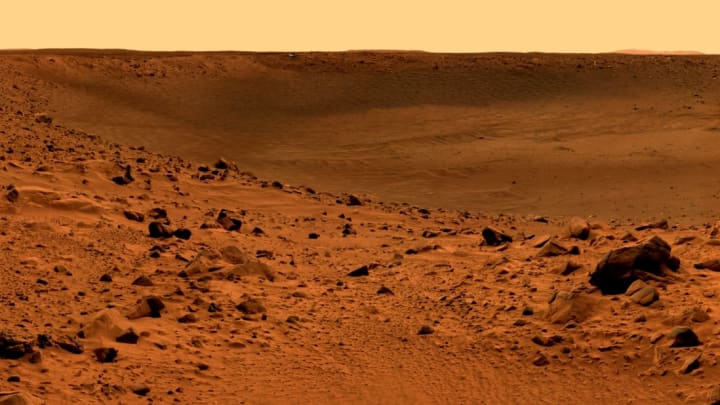It's impossible for NASA scientists to get their hands on authentic Mars dirt without sending a rover millions of miles to the red planet and back. A much more efficient way to study the properties of Martian soil is to pay $20 a kilogram for an approximation of the stuff that was cooked up in a lab.
According to the University of Central Florida, a team of astrophysicists from the college has successfully developed artificial dirt, called a simulant, that mimics what you'd find on the surface of Mars. The planet gets its signature red hue from a thick coating of oxidized iron dust. Beneath this layer is a crust of mostly volcanic basalt rock. Unlike terrestrial dirt, Martian dirt contains no organic matter, but it does carry nutrients like sodium, potassium, chloride, and magnesium.
All of the components that make up soil on Mars can be found on Earth, though some are easier to find than others. After formulating a recipe for their simulant, the UCF astrophysicists tracked down the ingredients, ground them into a powder, mixed them into a paste, baked the mixture, and pulverized it again. The final product is being sold to scientists interested in Mars research, such as the Kennedy Space Center, which has already placed an order for half a ton of the fake dirt.
For researchers looking at the feasibility of sending people to Mars, Martian dirt—or something a lot like it—is an invaluable tool. Every ounce of cargo will be precious on a potential Mars mission, and the ability to grow crops when the crew arrives on our neighboring planet could make the difference between the mission's success and failure. UCF's simulant allows scientists to test different methods of agriculture.
Like dirt on Earth, Mars dirt comes in many different varieties, and the formula developed by UCF isn't the standard used by all Mars researchers. But if anyone is looking to replicate experiments conducted with the UCF simulant, they can find the recipe in the study the researchers published in the journal Icarus.
Martian soil isn't the only space matter the university specializes in. The astrophysicists there also create simulants for lunar and asteroid soil, but these are much more difficult to make: Some of the ingredients can only be sourced from meteorites that have fallen to Earth.
